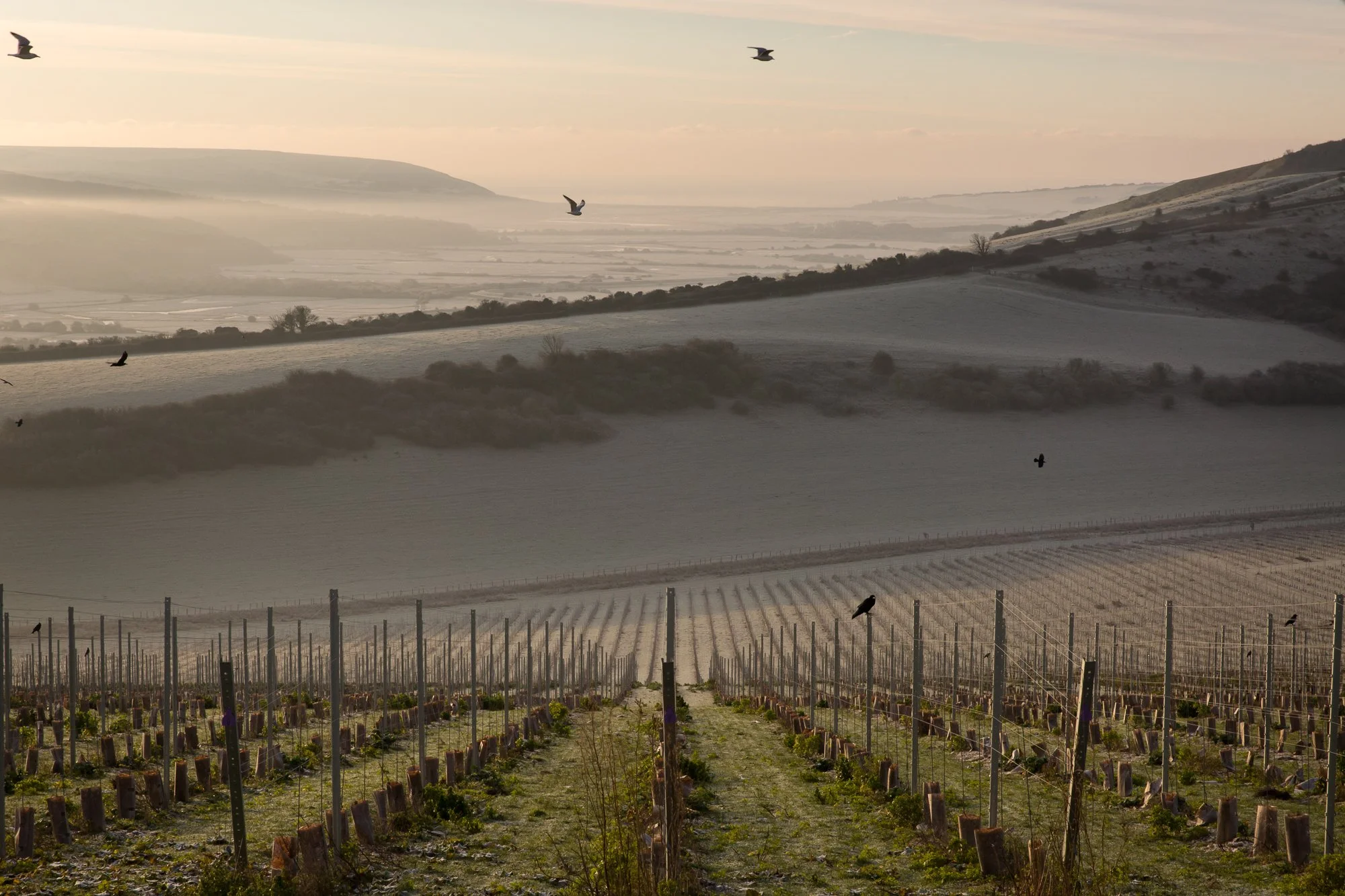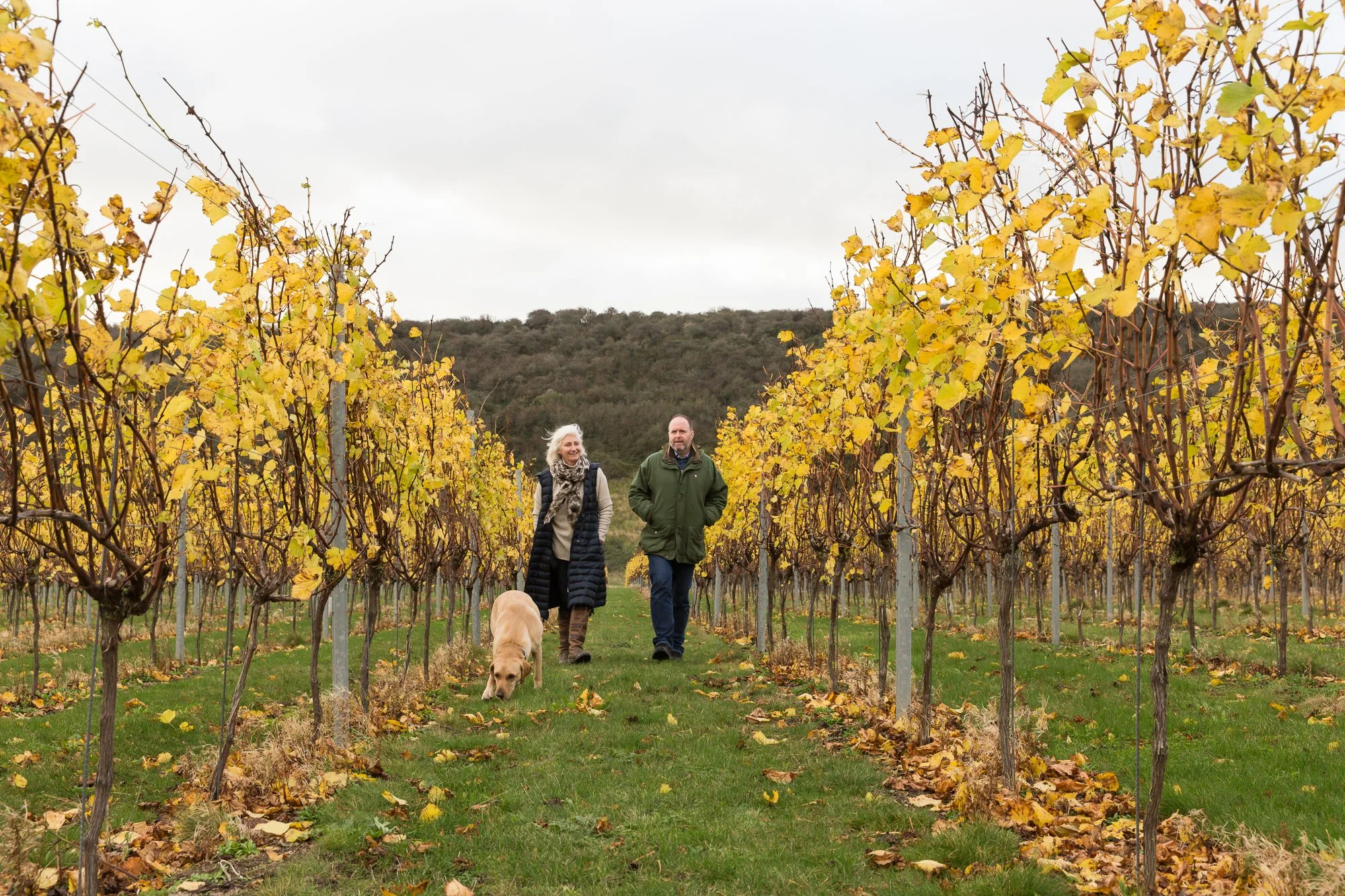PDO status granted for Sussex wine - A fantastic news for Rathfinny!
View of Seven Sisters from Rathfinny Wine Estate
The Sussex Wineries group is delighted to announce that the Secretary of State for Environment, Food and Rural Affairs has approved the registration of ‘Sussex’ as a Protected Designation of Origin (PDO) for wine under the new UK Geographical Indication (GI) scheme, thereby protecting the name Sussex for quality wines that are made in both East and West Sussex.
Sussex wine is only the second product to be granted protection under the newly created UK GI scheme and joins an illustrious list of products granted protection by the GI scheme, that guarantees a product’s characteristics or reputation, authenticity and origin. The UK government protects the product name from misuse or imitation.
Wines labelled as ‘Sussex’ must pass a stringent analytical test and qualitative analysis, by an independent tasting panel. In the case of Sussex sparkling wines this means that the wine must have been aged in the bottle for a minimum of 15 months, before release, and the wines are assessed for their clarity, aroma, taste and the characteristics of their bubbles.
The English wine industry has undergone considerable growth in recent years, with the total planted vineyard area in the UK quadrupling since 2000, now standing at over 8,750 acres (3,500 hectares). Sussex accounts for over a quarter of all the wine produced in the UK and its wine producers have won many awards in recent years in international wine competitions. The establishment of this PDO for Sussex wine brings Sussex in line with other well-known winemaking growing regions around the world, including Champagne, Burgundy, Napa, Marlborough and the Margaret River in Australia.
The original application for PDO status was granted temporary protection by the Department for Environment, Food, and Rural Affairs (DEFRA) in 2015 and submitted to the EU in 2016 for approval under the EU GI scheme. After the UK’s withdrawal from the European Union, it fell upon the UK government to approve it under the newly created UK GI scheme which supersedes the EU GI scheme.
Only those winemakers based in East and West Sussex, meeting a demanding set of quality standards will be able to use the name Sussex on their wine labels. As the county’s reputation for producing top quality wines has grown, Sussex sparkling wines now have the same appeal as a top-quality Champagne.
Most of Sussex sits on the same belt of chalk as Champagne – the Paris Basin – and due to rising temperatures also enjoys the same climate as the French wine region in its heyday in the 1950s.
Longer, cooler, summer days, because of its higher latitude, means grapes are able to mature longer on the vine than their modern French counterparts, ideal for producing ever more sophisticated flavour profiles and top quality wines.
Mark Driver, co-founder of Rathfinny Wine Estate, said: “We believe that the name Sussex will become synonymous with high quality sparkling and still wine, so when you go into a bar in London, New York, Beijing, or Tokyo you will be asked – Would you like a glass of Champagne or a delicious glass of Sussex?”
Miles Beale, Chief Executive of the Wine and Spirit Trade Association, said: “Not only does the PDO recognise the particular growing conditions found in Sussex, but it also shows the commitment of wine makers in this region to produce high quality still and sparkling wines under strict production criteria. The PDO scheme will enhance English wine's established reputation as a high-quality product to rival the best and boost its vast export potential.”
Simon Thorpe CEO of WineGB, stated that: "The establishment of the first regional wine PDO for Sussex is a great step forward for English Wine. This PDO application is a nod to the future of PDOs in England and Wales.”
Art Tukker, the owner of Tinwood Estate said: "The Sussex PDO will cement the bond between the unique soils and climate of the Sussex countryside with our truly remarkable sparkling wines, giving them a sense of place and purpose on the world stage amongst Champagne and our other great rivals.”
Mark Driver further commented: “We believe that Sussex will become a quality marque, reflecting what winemakers call terroir; the soils, influenced by the South Downs, the climate and people who make Sussex wines.
“Like Simon Thorpe at WineGB said, we firmly believe that this is a major step forward for this burgeoning industry, not just for Sussex vineyards, but also for English and Welsh sparkling wines as a whole.”
The new Sussex PDO will limit the grape varieties that can be used to make ‘Sussex’ wines. It will insist upon hand harvesting and restrict yields in the vineyards, ensuring that only the best grapes are used to make Sussex wines. These stricter winemaking rules also include a qualitative assessment and longer bottle ageing for Sussex sparkling wine.
The Sussex PDO will be a marque of quality, giving consumers an assurance of quality as well as provenance.
Background
Sussex is one of the oldest counties in England with a rich history of making award-winning wine, having already won some of the top accolades in the world: In 2010 Sussex wine producer Ridgeview won the prestigious Decanter Trophy for the ‘Best Sparkling Wine’ in the world. In 2015 a Sussex still wine producer was awarded the first ever gold medal awarded to any English still wine producer in the International Wine and Spirits Competition (IWSC).
The majority of Sussex vineyards are based either on the chalk or the greensands to the north of the South Downs. This major geological feature, that runs through East and West Sussex, has a significant calcareous influence on Sussex vineyards, providing ideal free draining soils for viticulture.
The effect of chalk in the soils of Sussex wine should not be underestimated. Chalk consists of calcite formed from the shells of marine organisms, which are highly porous and act as a reservoir (storing an estimated 300-400 litres of water per cubic meter) that provides the vines with a steady supply of water, even in the driest of summers. Chalk absorbs water through capillary action and the effort required to tap into this water supply puts the vines under just enough water stress in the growing season to achieve that delicate balance of ripeness, acidity and berry aroma potential.
The climate in Sussex is slightly warmer and dryer than most of England, with lower rainfall and an average of 1900 sunshine hours versus the UK average of 1340. The semi-continental climate and the soils are perfect for producing wines of great quality
Winemaking in Sussex also benefits from the presence of Plumpton College, the UK’s only university offering degree courses in viticulture, winemaking and carrying out research in wine making and viticulture.
Sussex is home to the largest cluster of vineyards in the England, representing a quarter of the total planted area in the UK (3,500ha) and nearly a third of total production.
For more information on Rathfinny’s wines in APAC, get in touch at info@nimbilityasia.com






